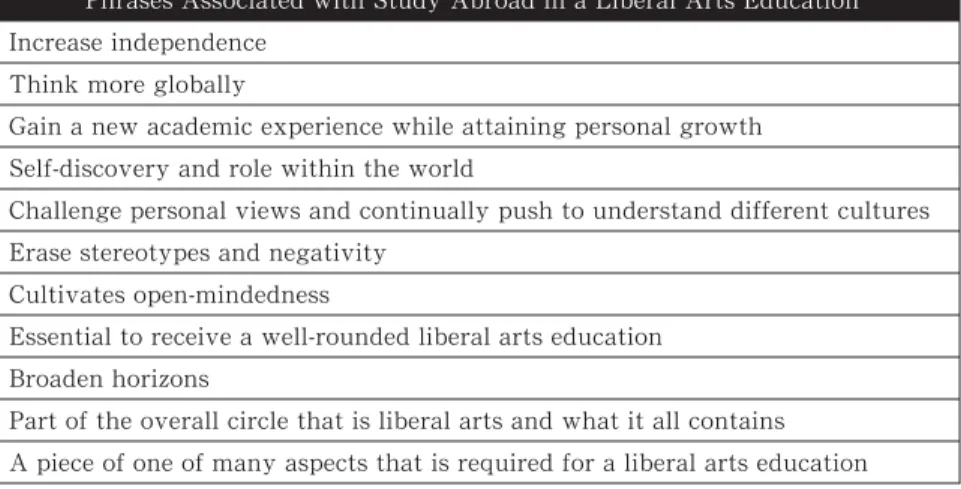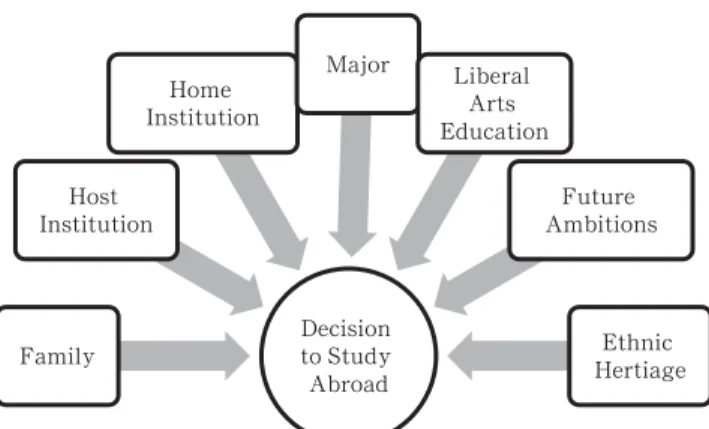The Decision to Study Abroad : A Case Study on the Individual Rationales of US Liberal Arts Students in Japan
著者名(英) Sarah Renee Asada journal or
publication title
The Kyoritsu journal of international studies
volume 35
page range 191‑202
year 2018‑03
URL http://id.nii.ac.jp/1087/00003218/
Introduction
Whenweexploretheinternationalizationofhighereducation,itisimportantto understandthecontextandenvironmentalfactors(Innis&Hellsten,2004).Globaliza- tionhaschangedthelandscapeoftheworld.Internationalizationisnotonlyinflu- encedbyglobalizationbutalsoavitalactoringlobalization.Internationalization・s twopillars,・at-home・and・abroad・,allownations,sectors,andinstitutionstointegrate international,intercultural,and globaldimensionsinto highereducation(Knight, 2008).Aswemoveforwardinthe21stcentury,ourworldisnotfocusedexclusively oneconomiccompetitiveness.Thereisalsoanemphasisoncooperationforeconomic, security,andglobalissues.Thepotentialpersonaloutcomesofstudyabroadplaceit asapivotalstrategyfornationstodevelopindividualsequippedwithintercultural skillsandinternationalmindsetstoachievetransnationalcooperation.Despitethis emphasisontheimportanceplaceduponstudyabroadtomeettheneedsofourever globalizingandintertwinedworld,individualrationalesforstudentmobilityremain anunderresearchedarea(Llewellyn-Smith& McCabe,2008;Nyaupane,Paris,& Teye, 2010).
A CaseStudyontheIndi vi dualRati onal es ofUSLi beralArtsStudentsi nJapan
SarahReneeAsada
Abstract
In the US,a wide range ofstakeholders,including the federalgovernment,non- governmentalagencies,andhighereducationinstitutions,realizetheimportanceofequip- pingstudentswithinternationalandinterculturalcompetencies.Studyabroad,aform of internationalizationofhighereducation,iswidelyviewedasamethodtoachievethesegoals.
ComparedtootherinstitutionaltypesintheUS,manyliberalartscollegeshaveahighstudy abroadparticipationrate.Liberalartscollegesprovideauniquecontexttoexplorestudy abroadduetotheirfocusonundergraduateeducationandtheimportanceplaceduponstudy abroadasoneofthemaincenterpiecesofinternationalizationefforts.Withthegrowing focusonincreasingstudyabroadparticipationrates,thisexploratorycasestudyexamines therationalesofliberalartscollegestudentsfrom theUSwhostudiedabroadinJapanfor oneyear.Empiricaldatafrom qualitativein-depthinterviewsidentifiedthefollowingemer- gentthemesintheindividualdecision-makingprocess:homeinstitution,family,ethnicheri- tage,futureambitions,hostinstitution,andliberalartseducation.
Withinthiscontext,thisexploratorycasestudyonaselectstudyabroadprogram inJapanaimstounderstandtherationalesandexpectedoutcomesthatinfluencedUS liberalartscollegestudentsintheirdecisiontostudyabroadinJapanforoneyear.
Qualitativein-depth interviewswith asemi-structured,open-endedapproach were conductedwith10respondents.Theempiricalevidenceprovidesinsightsintothe decision-makingprocessandidentifiedthefollowingemergentthemes:homeinstitu- tion,family,ethnicheritage,futureambitions,hostinstitution,andliberalartseduca- tion.
LiteratureReview
InternationalizationofHigherEducationandStudyAbroadintheUnitedStates Sincethe19thcentury,internationalizationofhighereducationandstudentmo- bilityhasbeenanimportantelementofUShighereducation(Altbach,2005;DeWit&
Rumbley,2008).Awiderangeofstakeholdersacrosssectors,includingpolicymakers, researchers,andpractitioners,haveurgedUShighereducationtorecognizeitsvital roleofprovidingmoreUSstudentswithinternationalexperiencesandskills(Norris
& Gillespie,2009).AccordingtoKnight,・internationalizationatthenational/sector/
institutionallevelsistheprocessofintegratinganinternational,interculturalorglobal dimensionintothepurpose,functionsordeliveryofhighereducationattheinstitu- tionalandnationallevels・(2004,p.21).Thedecentralized,mainlybottom-topprocess ofinternationalizationintheUSfocusesonstudyabroadasameansofinternationali- zation.Studyabroadiswidelyrecognizedasameanstomeetthechallengesofthe 21stcenturybycultivatinginterculturalcompetenciesandinternationalunderstand- ing(Altbach& Teichler,2001;Daly& Barker,2005;Kean& Hamilton,2008).Thisis supportedbythemostcommonlycitedbenefitsofstudyabroad:broadenedperspec- tiveandknowledge,foreignlanguageskills,interculturalcompetencies,interpersonal skills,andabilitytoengagewithdiverseculturalsituationsindailylifeandwork(e.g., Akande& Slawson,2000;Alfred& Byram,2002;Chao,2000;Dolby,2004)
Ifthecorefunctionoftheinstitutiondiffers,thentherationalesforinternationali- zationandpromotionofstudentmobilitymayalsodeviate(Knight,2008).Liberalarts collegespresentauniquecontexttoexploreinternationalizationandstudentmobility giventheircharacteristicsofhavingasmallstudentpopulation,emphasizingteaching andfacultycontact,student-centeredsmallclasssizes,broadcurriculum,andaninsti- tutionalfocusonthedeliveryofhighqualityundergraduateeducation.Intwoprevi- ousstudies(Hayward & Siaya,2003;Green & Siaya,2005),theadvantagesand disadvantagesforliberalartscollegesininternationalizationareexamined.Thead- vantagesnotedaretheclosefacultycontact,smallercampusandclassrooms,and activenessintherecruitment,financialsupportandgeneralsupportofinternational students.Furthermore,thereisoftenaninternationaldimensioninthecurriculum
withinternationalorientedcoursesandforeignlanguagerequirements.However,the smallnatureofliberalartscollegesalsopresentchallengestointernationalizationas well.Thedisadvantagesincludelesshumanresourcesandadministrativestructures tomonitorandimplementinternationalizationandinsufficientarticulatedcommit- menttointernationalization.
IndividualRationalesforStudyAbroad
Studyabroadprogramsstem from theearlypost-WWIperiodtoprovidestudents theopportunityofajunioryearabroad.Theoriginalpurposeofthejunioryear abroadwasforstudentstospendoneacademicyearimmersedinanothercountryto developthefollowingareas:・curricular(todevelopforeignlanguageskills);cross- cultural(tolearnaboutotherculturesasameansofpreventingfuturewars);andde velopmental・(Twombly,Salisbury,Tumanut,andKlute,2012,p.15).Severalration- alesidentifiedbyNyaupaneetal.(2010)includepromotingworld-windednessand internationalunderstanding,educationalgoalsofforeign languageproficiency,in- creasingcompetitivenessandcareeropportunities,andexploringclassesandsubject areasnotavailableathomeinstitutions.Otherrationalesincludeunderstandingmore aboutthehostcountry,viewinghomecountryfrom acomparativeperspective,cul- turalenrichment,culturalskills,personaldevelopment,anddesiretotravel(Teichler
& Steube,1991).
Today,manyhighereducationinstitutionshavehopestoincreasestudyabroad participationrates.Furthermore,studyabroadisnow beingincorporatedintothe academiccurriculum moresothan before(Fry,Paige,Jon,Dillow,& Nam,2009). Despitethisgrowingemphasisofincreasingstudyabroadparticipationratestoculti- vate intercultural competencies and foster internationally-minded individuals, Nyaupaneetal.(2010)statethattheliteratureexaminingthemotivationsofstudy abroadparticipantsisremainslimited.Atthecoreofstudentmobilityandthedeci- sion-makingprocessthatleadstostudyingabroadistheindividual.Therefore,the rationalesthatfacilitatestudentmobilityontheindividuallevelareimportantto recognize.Inaddition,Llewellyn-SmithandMcCabe(2008)highlighttheimportance ofunderstandingindividualrationalesbecausetheglobaleducationmarketplaceis becomingincreasinglycompetitivewithmorestudentscrossingbordersandmore studyabroadoptions.
TheContextofJapanforUSStudyAbroadStudents
TheUSandJapanhavealonghistoryofmutualacademicexchange.Historically, Japanisthetopnon-traditionaldestinationforUSstudyabroadstudentssincethe 1950suntilitwassurpassedbyChinaattheturnofthe21stcentury(Instituteof InternationalEducation2010,2011,2012,2013,2014,2015).Inaddition,theUSistheone countryfrom outsideofAsiainthetopsendingcountriestoJapan(JASSO2015).
DespitetheprominenceofChinaasahostdestinationandemergingpopularityof SouthKorea,thenumberofUSstudyabroadstudentschoosingJapanastheirhost countrycontinuestoincreaseatthesameoverallincreaserate.
Inthelastthreedecades,Japanhasimplementeddifferentplanstoineffortsto internationalizationitshighereducationsystem andattractinternationalstudents.
Theeducationreformsinthe1980saimedtocontinuesocialandeconomicprosperity andfurtherdevelopmentasaleaderoftheworld(Yonezawa,2003b).Duringthistime, the・100,000by2000・planaimedtoincreasethenumberofinternationalstudents studyinginJapanto100,000bythe21stcentury.Thisplanwasachievedin2003.In 2001,the・21stCenterofExcellencePlan・wasestablishedtofosterworld-classresearch universities(Yonezawa,2003a).In2008,the・300,000by2020・planwasinitiatedwith amissiontocreate・AJapanThatisOpentotheWorld・aspartofthecountry・sglobal strategyandboostnumberofinternationalstudentsto300,000andsupportsJapan・s internationalhuman resourcepoolwhilealso building human networksbetween Japanandothercountriesandenhancingmutualunderstanding(MEXT,2009).In 2009,the・Global30Project・selected13universitiesimplementmajoruniversitylevel internationalization strategiesduring thefirstfive-yearcycle(Kato,2010;MEXT, 2011).InJapan・sinternationalizationefforts,thereisanevidentfocusontherecruit- mentofinternationalstudentsfrom allregionsoftheworldinthestrategies.
Methodology
Thisexploratorycasestudyemployedqualitativein-depthinterviewsinorder understandtherationalesandexpectedoutcomesthatinfluencedAmericanliberal artscollegestudentsintheirdecisiontostudyabroadinJapan.Semi-structured,open- endedquestionswereutilizedtocollectdatainthestudyabroaddecisionmaking processwiththeprimarygoalofidentifythemainmotivatingfactorsthatinfluences studentstochoosetheirhostcountryandstudyabroadprogram.Eachinterview was digitallyrecordedforaccuracyandlastedapproximately90minutes.
Conveniencesamplingwasusedbytheresearcheronaselectstudyabroadpro- gram.Anemailelicitingvolunteersfortheresearchwassentto28studentsfrom U.S.
liberalartscollegesofwhom justarrivedinJapantostarttheirstudyabroad.Outof the28students,atotalof10interviewswereconductedinthefallof2010.Atthetime ofthestudy,therespondentshadspenttwoweeksinJapan.Alltherespondentswere participantsonthesamestudyabroadprogram andplanneddurationattheirhost institutionwasoneyear.Participantsofthisresearchstudyincluded7femalesand3 males.3oftherespondents・majorswereJapanesestudies,2wereEastAsianStudies, and1wasAsianStudies,Additionally,thereweremajorsofCulturalAnthropology, Art,andHistory.Duetotheexploratorydesignofthisstudy,thisstudydoesnot representtheaveragestudyabroadparticipant.Thestudyaimstoshedlightuntoone
particularsubsetofstudyabroadparticipants:studentsofliberalartscolleges.
Thecollecteddataweretranscribedverbatim andfirstcodedusingopencodingto identifyemergentthemes.Thenextstepinthecodingprocesscategorizedthecodes bygroupingthem aroundphenomenadiscoveredinthedata.Theinterview datawas organized intodifferentthemesand issuestofurtherconceptualizetheemergent themesby codinguntiltheoreticalsaturation wasreached. Quotationswerethen selectedfrom theinterviewsthatilluminatedthethemesandissues.
DataAnalysisandFindings
Thedataanalysisfoundthefollowingemergentthemesinrelationtothestudents・
studyabroaddecision:homeinstitution,family,ethnicheritage,futureambitions,host institution,andliberalartseducation.Althoughthethemesarelistedseparately,it mustbenotedthatthethemesinteractwith each otherthroughoutthedecision- makingprocess.
DecisiontoStudyAbroad
Therearetwotimeframeswhenrespondentsdecidedtostudyabroad:before enteringcollegeandafterenteringcollege. ・Sincehigh schoolIwantedtostudy abroadsomewhere.So,goingintocollegeIknew itwassomethingthatIwasgoingto do・(R1).Forrespondentswhoidentifiedthattheywantedtostudyabroadbefore theyenteredcollege,they・oftenmet...exchangestudentsinhighschool...always thoughtthatsoundedawesome・(R3).Themajormotivationsforstudyabroadfor theserespondentsincludedmeetingexchangestudentsinhighschool,havingfamily memberswhoparticipatedininternationalactivities,andlanguageclassestakendur- ingtheirsecondaryeducation.
Theabilitytostudyabroadwasamajorfactorintheirdecision-makingprocessof selectingtheirhomeinstitution:・studyabroadwasdefinitelyonmylistofthingsmy collegehadtohave・(R3).Forsomerespondents,theydecidedtostudyabroadafter enteringcollegewhenthey・foundoutaboutthedifferentprogramsthatwereoffered・
(R5).Theyfoundinformationabouttheavailablestudyabroadprogramsthrough languageclasses,studyabroadfairs,andfaculty.
HomeInstitution
Asignificantinfluenceforalloftherespondentswastheirhomeinstitution.Their homeinstitutionsencouragedthestudentstostudyabroad.R6tellsofanenviron- mentthatencouragesandcultivatesstudyabroadthatalltherespondentsexperi- encedintheirhomeinstitutions.Shefeltthatthroughhearingaboutotherstudents・
studyabroadexperiencesher・sparkwasignitedandwitheverystory[her]flame wouldgrow biggerandbigger.・Thisreflectsthefactthatliberalartscollegeshavea
highstudyabroadparticipationrates(Green& Siaya,2005).Thecharacteristicsof liberalartscollegesalsocontributetostudentsfeelingthat・junioryearisjusttheyear wheneveryonegoesoffanddoessomething(abroad)・(R3).Giventhatliberalarts collegeshavesmallenrollments,smallclass-sizes,andareresidential,therearemore opportunitiesforstudentstointeractwitheachotherandrelytheirexperienceswith studyabroadcomparedtootherinstitutionaltypeswithalargestudentpopulation, largerclasses,andmanystudentswhodonotliveoncampusthatcanresultinless opportunitiestosharestudyabroadexperiences.
Thehomeinstitutionalsoaidedandfacilitatedintheprocessoffindinginforma- tion,preparations,andapplicationforstudyabroad.Manyrespondentssharedthat theyattendedstudyabroadfairsandstudyabroadprogram representativesvisiting languageclasses.・Ididn・tfeellikeIwasdoingitbymyselforanything.Theywill workforyoutoseethebestwaytogoaboutdoingitandhelpingwithclassestomake suretheytransfersokay,likeclassesandstufflikethat・(R2).Thedisseminationof studyabroadopportunitiesalongwiththeadministrativesupport,asdescribedbyR2, providesanenvironmentconductivetothepromotionofstudyabroadparticipation.
Family
Familialinfluencewasamajorpartofthedecisiontostudyabroadformanyof therespondents.Forsomerespondents,theyhadpreviousexperienceoftravelling abroad,siblingswhohadstudyabroadexperiences,orfamilymemberswhoworked abroad.Therespondentsalsoidentifiedtheirparentsasbeingsupportiveintheir decisiontostudyabroad.However,foronerespondent,therewasabarrierinthe beginning.・Theydon・tunderstandwhyIwanttostudyabroadmostofthetime,but theyarelike,・ifthatiswhatyouwanttodoandthat・syourdream,Iknow thatyou・ll behappyaboutit・(R5).AccordingtoR5,thefamilyeventuallyacquiescedandsup- portedthedecisiontostudyabroadtocultivategloballeadershipneededinherfuture career.
EthnicHeritage
Ofthetenrespondents,threeidentifiedwithhavingfamilialtieswiththehost country.Fortheserespondents,comingtothehostcountrywas・comingbackto(my) roots.WhileIam here,hopefullyIcancheckoutsomerelativesthatstillliveherethat I・venevermetbefore.So,Ithinkitismoreofthatkindofthing,myownpersonroad aswelltocomehere・(R2).ForR1,・asIwastakingtheseclasses(mymother・snative language)Igotmoreinterestedinmymother・sculture.So,IstartedthinkingthatI wantedtogotoJapan.Especially,myfamilyhere(inJapan)istryingtotalktome, anditwouldbereallyinterestedifwecouldbecomecloser.・Bystudyingabroadinthe hostcountry,thethreerespondentsfelttheycouldbecomeclosertotheirethnicheri- tageandreconnectwiththeirfamilyonadeeperlevel.
FutureAmbitions
Alloftherespondentsindicatedstudyingabroadwouldaffecttheirfutureand
・alwaysknew studyingabroadwouldchange・them(R8).Forsome,theycould・see how thefeelingishere(inthehostcountry)andif(they)likeit.Justgetanideaand testthegrounds・(R2)bystudyingabroadinthehostcountry.Somerespondentsfelt likeR4:・Ididn・treallyknow whatIwanttodointhefuture,sopartlycominghereI partlyhopedthatImightstumbleonsomethingthatImightthinkIwanttodo.・.R5 echoestheview ofstudyabroadasanigniterofinterestinacareerpathasshe thought・Iwouldprobablyfoundoutduringmytimestudyingabroadbecausesome- thingwouldprobablysparkmyinterestsomewhere.・Forrespondentswhowerenot sureoftheircareerplans,they・werehopingthatbytheendoftheyearIwouldhave anideaofthekindofcareerIwouldwanttogointo・(R8).
Inadditiontofindingguidancefortheircareerpath,respondentsfeltthatthey wouldgaininterculturalcompetencethatwouldbetterequipthem toenterthework- forceupongraduation.Below,notonlydoesR3recognizetheskillsstudyingabroad willgiveher,butshealsoreferstothecompetitiveedgeshethinksshewillhavecom- paredtothosewhoneverstudiedabroadwhensheenterstheworkforce.
R3:Ithinkalotofcompanies,especiallytheonesIam interestedinthefuture, reallywantssomeonewhoiswellroundedassupposedtosomeonewhojust studied.Someonewhocantalktopeoplewithopendoors,someonewhohas beenthroughchallengingtypesofexperiencesthataren・ttherunofthemill.
(Peoplelikethat)hasmoreofashotinwhateverkindofthingstheywantto dointhefuture.Yeah,definitelyIthoughtstudyabroadwouldhelp.
Thereputationofthehostinstitutionwasanimportantfactorwhendecidingon thestudyabroadprogram andtheirfutureambitions.R7statesthenamevalueofthe hostinstitutionisimportantforhim.Thehostinstitutionhasahighbrandvalue comparedtohishomeinstitution.Thisisechoedbymanyrespondentswhoalsoshare thatthenamevalueoftheinstitutioncouldbeimportantwhenapplyingforjobs relatingtoJapanandAsia.R1alsonotestheimportanceofthehostinstitution・sname valueandconnectionsmadeforthefuture:・peoplewhogotothishostinstitution sometimestheya.learnmoreandb.inthefuture,theyhavebetterconnectionspartly becauseofthenameandprestigeofthehostinstitution...inTokyo,youcanmakea lotofconnections.・
Severaloftherespondentsalsoidentifiedtheirundergraduatestudyabroadexpe- rienceasasteppingstoneforfuturestudiesatthegraduatelevel.・Afterschool,Iam thinkingofapplyingforresearchgrantstodosomeofmystudiesinJapan.Iam also planningtogotograduateschool,possiblywithinJapanortheEastCoast・(R1).
HostInstitution
Thethemeofcoursesatthehostinstitutionwasprevalentintheinterviews.The hostoffersacademiccoursesinEnglish.Therespondentswerelookingforwardto taking・alotofclassesthatweren・tavailableatmycollege・(R5)and・gettingadiffer- entperspectiveofhow professorsteach,whichisinteresting.Ilikehavingalotof differentexperiences・(R4).Overall,therespondentswere・excitedaboutlearning・at thehostinstitution(R6).
However,manyrespondentsvoicedconcernsaboutthecoursesatthehostinstitu- tion.Manyoftherespondentstalkedwithpastparticipantsofthestudyabroadpro- gram.R6recountshertalkwith・studentswhohadgoneinthepast,theyhadsaidthat thecoursesarenotasdifficultincollegesinJapancomparedtoatmycollege...They saidthattheclassesarehelpful.But,youhonestlylearnalotoutsideoftheclassroom too.So,Iwasn・treallyworriedaboutthelevelorthedifficulty.・R6isleadtobelieve classesatthehostinstitutionwouldnotbecomparabletoherhomecollege.Shethen recognizestheimportanceofexperiencingdailylifeinthehostcountrytogaina deeperunderstandoftheculture.AsR2states,・justlivinginthesociety,youcanget moreinformationIthink.Byjustobserving,Icanseetheroles.Ithinkitallcanhelp me.・
Otherconcernsrespondentshadpertainingtotheacademicexperienceattheir hostinstitutionincluded:・goingfrom suchasmallschooltosuchabigschool,itis muchmoreimpersonal・(R4).R4continuestodiscussthedifferencesofherhome institutionandhostinstitutioninregardstothestyleoftheclass.Becauseherhost institution,likemostliberalartscollege,hassmall,discussionstyleclasses,shewas concernedabout・havingtheopportunitytoheardifferentpeople・spointsofviewsand notjusttheprofessors・becausetheprofessorsknow alotbuttheyarenotinfallible.・ R4divulgesthatshewas・not...necessaryworriedifIwoulddowellacademically,but morejustthatitwouldbeabigchange...alotofclasses(atthehostinstitution)are gradedonamidterm andafinaltest.Atmyhomecollege,therearenotalotofmid- termsandfinals.Thegradingismorespreadoutoverthesemester.・Thestyleof coursesofferedattherespondents・homeinstitutionandhostinstitutiondiffered.
Althoughtherespondentswereanxiousabouthow theywouldfareinlarger,lecture- basedclasses,theywerealsoeagertoexperienceandembracethecoursesatthehost institutiontogainnew perspectivesfrom facultymembersnotonlyfrom Japanbut aroundtheworldinatrulyinternationalclassroom.
StudyabroadinaLiberalArtsEducation
Alloftherespondentscommentedthatstudyabroadwasanimportantpartof theirliberalartseducation.Whenposedwiththequestion,・How doyoufeelstudy abroad fitsinto yourliberalartseducation?・,allrespondentsshared theirown
definitionofliberalartseducation.Someofthekeyphrasesthatwerereoccurringin theirresponsesareasfollows:establishingagoodfoundation;becomingwellrounded bystudyingabroadscopeofdifferenttopics;broadeningyourworldview;finding yourinterests;andopeningyourminduptheworldanddifferenttopics.
Whentherespondentselaboratedonthemeaningofstudyabroadwithinthe contextoftheirliberalartseducation,manyofthesamewordsandphrasesemerged repeatedlyineachinterview.Table1liststhereoccurringideasexpressedbythe respondents.Allofthephrasesoverwhelmingrefertointernationalandintercultural competenciesthestudentshopetoacquireduringtheirstudyabroad.Thisfinding stronglysupportsstudyabroadasastrategytocultivateindividualsequippedwith interculturalcommunication skillsand aglobalperspectiveforglobalhuman re- sources(Daly& Barker,2005;Kean& Hamilton,2008).
DiscussionandConclusion
Thesalientfindingsidentified,asillustratedinfigure1,from thequalitativeem- piricaldatacollectedthroughin-depthinterviewsrevealsthatstudyabroadpartici- pantsaregenerallyoptimisticabouttheirstudyabroadprospectsandenvisiontheir study abroadasboth an academicsojourn andapersonalsojourn. A ccordingto Nyaupaneetal.(2010),Americanstudentsaremotivatedbynon-academicdesiresfor internationaltravelratherthetraditionalbenefitshighlightedbyinstitutionsasaca- demicandcareeroriented.However,thefindingsofthisstudycontradictthisand findsthatstudentsstudyabroadnotonlyforapersonalsojournbutalsoforacademic, futureprospects,andinterculturalandinternationalmindedness.Thisfindingmaybe theinfluencedtheacademicemphasisplaceduponstudyabroadinliberalartscollege andacademicmajorsrelatingtothehostcountryand/orregion.
Table1 StudyAbroadinaLiberalArtsEducation PhrasesAssociatedwithStudyAbroadinaLiberalArtsEducation Increaseindependence
Thinkmoreglobally
Gainanew academicexperiencewhileattainingpersonalgrowth Self-discoveryandrolewithintheworld
Challengepersonalviewsandcontinuallypushtounderstanddifferentcultures Erasestereotypesandnegativity
Cultivatesopen-mindedness
Essentialtoreceiveawell-roundedliberalartseducation Broadenhorizons
Partoftheoverallcirclethatisliberalartsandwhatitallcontains A pieceofoneofmanyaspectsthatisrequiredforaliberalartseducation
Whiletheempiricaldatadidnotidentifymajorconcernsorbarrierstostudy abroad,itshouldbenotedslightconcernsabouttransferofcreditstowardsmajor, financialmatters,andlifeintheirhostcountrywereraisedbyseveralrespondents.
However,asaresultoftheirhomeinstitutionsgeneralsupportiveatmosphere,these issuesdidnothindertheirparticipationinstudyabroad.Nonetheless,itisworth- whileforinstitutionstobetteraddresstheseissuesandprovidefurthersupportfor studentsinordertofacilitatestudyabroadforallstudents.Thisconclusionisfurther supportedbyGarverandDivine(2007)thatadvocateforinstitutionstorecognizethe needsoftheirstudentsanddesignprogramstomeetthestudents・needsasawayto increasestudyabroadparticipationrates.
Theinquiryintotheroleofstudyabroadinaliberalartseducationresultedina unanimousrecognitionofstudyabroadasanintegralpartoftheirliberalartseduca- tionandtheimportanceofcultivatinginternationalandinterculturalcompetences throughstudyingabroadtobecomeaglobalcitizen.Thisfindingmaybearesultthat manyoftherespondentsidentifiedthattheirhomeinstitutionsandacademicadvisors highlyadvocateforparticipationinstudyabroadprograms.Therefore,studyabroad becomesanaturalcomponenttoaliberalartseducation.
Withintheinternationalizationofhighereducation,thereisastrongemphasison studyabroadasameanstopromoteinternationalunderstandingandintercultural competencies.Therealsoisagreatimportanceplaceduponstudyabroadasaninte- gralcomponentofaliberalartseducationtoprovidestudentswithaglobaloutlook, interculturalcompetence,academicgrowth,andpersonalsojournbasedontheempiri- calfindingsofthisstudy.Bothindividualsandinstitutionsrecognizetheneedof internationalunderstandingandinterculturalcompetencyinordertocompeteinthe globalknowledgeeconomy. Stridesarebeingmadein theinternationalization of liberalartscolleges.Bytakingintoconsiderationtheneedsoftheirstudentsand individualrationalesinthedecision-makingprocessforstudyabroadparticipation,
Decision to Study Abroad Family
Host Institution
Home Institution
Major
Liberal Arts Education
Future Ambitions
Ethnic Hertiage
Figure1 IndividualRationalesforStudyAbroad
liberalartscollegescanweaveinternationalizationandstudyabroadintothefabricof theirinstitution.
References
Akande,Y.&Slawson,C.(2000).Acasestudyof50yearsofstudyabroadalumni.International Educator,9(3),1216.
Alred,G.& Byram,M..(2002).Becominganinterculturalmediator:A longitudinalstudyof residenceabroad.JournalofMultilingualandMulticulturalDevelopment,23(5),339352. Altbach,P.(2005).HarshRealities:Theprofessoriatefacesanew century.InP.Altbach,R.
Berdahl,&P.Gumport(Eds.),Americanhighereducationinthetwenty-firstcentury(2nded., pp.287314).Baltimore,MD:JohnHopkinsUniversityPress.
Altbach,P.&Teichler,U(2001).Internationalizationandexchangesinaglobalizeduniversity.
JournalofStudiesinInternationalEducation,5(1),525.
Chao,M.(2000).ResearchonU.S.StudentsStudyAbroad:AnUpdate19882000.Retrieved from University of Southern California,Center for Global Education Web site:
http://www/usc/edu/dept/educational/globaled/ro/book_research_chao.htm.
Daly&Barker.(2005).AustralianandNew Zealanduniversitystudents・participationininter- nationalexchangeprograms.JournalofStudiesinInternationalEducation,9(1),2641. DeWit,H.&Rumbley.(2008).TheroleofAmericanhighereducationininternationalstudent
circulation.InDeWit,H.,Agarwal,P.,Said,M.,Sehoole,M.,andSirozi,M(Eds),Thedy- namicsofinternationalstudentcirculationinaglobalcontext,pp.199231,SensePublishers.
Dolby,N.(2007). Reflectionson nation:American undergraduatesand education abroad.
JournalofStudiesinInternationalEducation,11(2),141156.
Fry,G.;MichaelPaige,R.;Jon,J.;Dillow,J.;and Nam,K.(2009). Study Abroad and its TransformativePower.CIEE:CouncilonInternationalEducationalExchange.Retrieved from http://www.ciee.org/home/research-publications/documents/CIEEOccasionalPaper s32.pdf
Garver,M.& Divine,R.(2007).Conjointanalysisofstudyabroadpreferences:Keyattributes, segments,andimplicationsforincreasingstudentparticipation.JournalofMarketingfor HigherEducation,17(22),189215.
Green,M.& Siaya,L.(2005).MeasuringInternationalizationatLiberalArtColleges.American CouncilonEducation.
Hayward,F.& Siaya,L.(2003).MappingInternationalizationofU.S.Campuses.American CouncilonEducation.
Innes,P.& Hellsten,M.(2004).Internationalizationhighereducation:Criticalperspectivesfor criticaltimes.London:Routledge.
InstituteofInternationalEducation.(2010).Opendoors:Reportoninternationalstudentex- change60years.[CDROM]New York,NY:InstituteofInternationalEducation and EducationUSA.
InstituteofInternationalEducation.(2011).OpenDoors:2011fastfacts.Retrievedfrom http://www.iie.org/~/media/Files/Corporate/Open-Doors/Fast-Facts/Fast%20Facts%202 011.pdf?la=en
InstituteofInternationalEducation.(2012).OpenDoors:2012fastfacts.Retrievedfrom Insti- tuteof
http://www.iie.org/~/media/Files/Corporate/Open-Doors/Fast-Facts/Fast%20Facts%202 012-final.pdf?la=en
InstituteofInternationalEducation.(2013).OpenDoors:2013fastfacts.Retrievedfrom http://www.iie.org/~/media/Files/Corporate/Open-Doors/Fast-Facts/Fast-Facts-2013.pdf
?la=en
InstituteofInternationalEducation.(2014).OpenDoors:2014fastfacts.Retrievedfrom http://www.iie.org/~/media/Files/Corporate/Open-Doors/Fast-Facts/Fast-Facts-2014.pdf
?la=en
InstituteofInternationalEducation.(2015).OpenDoors:2015fastfacts.Retrievedfrom http://www.iie.org/~/media/Files/Corporate/Open-Doors/Fast-Facts/Fast-Facts-2015.pdf
?la=en
JASSO(2015).InternationalStudentsinJapan2015.Retrievedfrom http://www.jasso.go.jp/en/about/statistics/intl_student/data2015.html
Kato,S.(2010). Enhancingtwo-way internationalstudentsmobility. Presentation by the DeputyDirector-GeneralofHigherEducationBureau,MinistryofEducation,Japanatthe InternationalDevelopmentofHigherEducationinthe21stCenturySymposium.Waseda University.November13.
Kean& Hamilton.(2008).The9/11commissionreport.Washington,DC:NationalCommission onTerroristAttacksupontheUnitedStates.
Knight,J.(2008)HigherEducationinTurmoil:TheChangingWorldofInternationalization.
Rotterdam,Netherlands:SensePublishers.
Llewellyn-Smith,C.& McCabe,V.(2008).Whatistheattractionforexchangestudents:the hostdestinationorhostuniversity?Empiricalevidencefrom astudyofanAustralian university.InternationalJournalofTourism R esearch,10(6),593607.
MEXT.(2009).・G30planandtheideasbehindit(Ryuugakusei30manninkeikakunokossi torimatomenokangaekata)(留学生30万人計画の骨子とりまとめ考え方).Retrievedfrom http://www.mext.go.jp/b_menu/shingi/chukyo/chukyo4/houkoku/attach/1249711.htm MEXT.(2011).Global30universities.Retrievedfrom
http://www.uni.international.mext.go.jp/global30/
Norris,E.& Gillespie,J.(2009).How studyabroadshapesglobalcareers:Evidencefrom the UnitedStates.JournalofStudiesinInternationalEducation,13(3),382397.
Nyaupane,G.,Paris,C.,&Teye,V.(2010).Studyabroadmotivations,destinationselectionand pre-tripattitudeformation.InternationalJournalofTourism R esearch.13,205217. Steglitz,I.E.(1993).Interculturalperspective-taking:theimpactofstudyabroad(Doctoral
dissertation,UniversityofMinnesota,1993).DissertationAbstractsInternational,54(08), 2799.
Teichler,U.& Steube,W.(1991).Thelogicsofstudyabroadprogrammesandtheirimpacts.
Highereducation,21(3),325349.
Twombly,S.B.,,Salisbury,M.H.,Tumanut,S.D.,andKlute,P.(2012).Studyabroadinanew globalcentury:Renewingthepromise,redefiningthepurpose.ASHEHigherEducation Report,38(4).
Yonezawa,A.(2003a).Making・world-classuniversities・:Japan・sexperiment.HigherEducation ManagementandPolicy,15(2),923.
Yonezawa,A.(2003b).TheimpactofglobalisationonhighereducationgovernanceinJapan, HigherEducationResearch&Development,22(2),145154.

